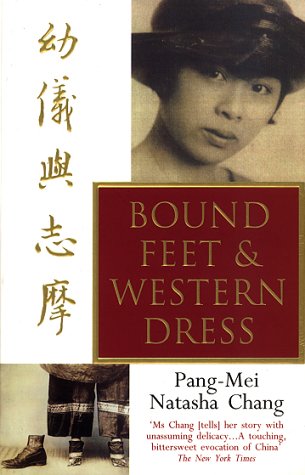
The author, Pang-Mei Natasha Chang was a Chinese studies major at Harvard when to her great surprise, her great aunt's name popped up in a textbook. This makes her curious enough to want to talk to her aunt Yu-i about her life in China. This results in a very poignant memoir of her very Chinese aunt who grew up in China in the early part of the 20th century where filial piety and duty towards one's husband and then one's sons came above and before everyone and everything else in a woman's life. The first chapter, aptly titled, "A Woman is Nothing", tells it all.
Take for instance, the tradition of foot binding.
Great-Aunt Yu-I describes the pains of foot binding in detail. She explains the breaking of the bones in the foot, the removal of bloody bandages, the soaking, the rewrapping and tightening of the bandages. The process began when Yu-I was three years old. When her brother saw the pain Yu-I was in, he insisted that his mother stop the painful binding, but the mother worried that without bound feet, no man would marry Yu-i. Bound feet are not only considered beautiful like a lotus flower, but they also serve to control women and keep them confined to their houses.
Another way they controlled women was to keep them ignorant. Although Yu-I was a keen learner she found few opportunities to gain an education.
Anyway, as Pang-Mei continued to interview her aunt, she found to her great astonishment, that her eighty-three-year-old aunt had once been married to Hsu Chih-mo, China's preeminent modern poet and had suffered the anguish of enduring what is considered China's first Western-style divorce. The reason the marriage didn't work was because Hsu Chih-mo wanted a Western-thinking woman with modern ideals, but who would remain subservient to him and his parents. Little did he realize that 'bound feet and western dress' did not mix. Also, all Chinese women at that time had to accept their husband's concubines without a fuss or without showing any kind of jealousy because along with disobeying his parents, not being able to bear him sons, commiting adultery, being repulsively sick, talking too much and commiting theft, being jealous was one of the seven recognized grounds for divorce!
Yu-i's story does end happily enough, in that, she makes a life for herself in Shanghai and goes on to become the Vice-President of the Women's Bank before she has to immigrate to the US to escape the Cultural Revolution.

No comments:
Post a Comment